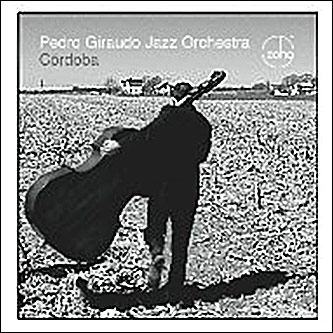American Music Review
Vol. XLI, No. 2, Spring 2012
By Russ Spiegel, New York City
Harlem may be a long way from Buenos Aires, but there is an unde- niable correlation between the music of the great American compos- er Duke Ellington and the Argentinean bassist, composer, arranger, and bandleader Pedro Giraudo. This is clearly evident on the new CD released by the award-winning Pedro Giraudo Jazz Orchestra, Córdoba (Zoho ZM 201106).
One facet of Ellington's approach, much of it achieved in tandem with Billy Strayhorn, was the use of geographic elements as sources of inspiration, especially in larger works such as The Far East Suite, The Latin American Suite, The New Orleans Suite, and The Afro-Eurasian Eclipse. Similarly, Giraudo's Córdoba is a paean to a geographic place, in this case, the musician's birthplace: Córdoba is both a major city and the capital of the same- named province situated some 700 miles away to the northwest from Buenos Aires, Argen- tina. For Giraudo, growing up in Córdoba had a strong influence on his later life and provided the impetus for the music on this recording.
Both Giraudo and Ellington exploit their specific cultural roots in their compositions. Ellington's music, even in his suites inspired by his travels, remains steeped in the blues, jazz, and the American experience. The thirty-five year old Giraudo, though New York-based for over a decade and well versed in American jazz honors the music of his own cultural background, the Argentine popular folk styles chacacera, zamba, and baguala.
Córdoba consists of six titles. Each composition depicts one aspect of Giraudo's relationship with, and experiences in, Córdoba and its environs. The opening number, "Visitas (Visits)" places us without introduction back at the Giraudo farm as first the trombones, then the saxophones replicate the feel of a weekend visit by friends and family.

Pedro Giraudo Jazz Orchestra Córdoba (Zoho, 2011)
The second track, "Pueblo (Village)," is an exquisite twenty-minute three-part suite that is a marvel of thematic and harmonic construction and alone makes the purchase of this CD worthwhile. The piece is a musical depiction of life in the Córdoban countryside. The first movement begins quietly with soft reeds evoking a village's greeting of the day, and features Tatum Greenblatt on flugelhorn. This slowly develops into the second section, which conveys the more hurried feel of city life, made more pronounced by a 5/8 time feel, and spellbinding solos by Todd Bashore on alto saxophone and drummer Jeff Davis. The conclusion begins with an almost hard-rock groove, with the baritone saxophonist suggesting the sound of Ellington's Harry Carney. Later follows an expressive solo by pianist Jeff Jurkovic, while Giraudo's band slowly deconstructs the music before returning to the original theme. Solos are judiciously and strategically placed to intensify the momentum of the composition. The other tracks continue in the same vein: "Sol Naciente" ("Sun Rising"), "Duende del Mate" ("The Dwarf of the Mate"), "A La Escuela" ("The Road to School"), and "Latente" ("Dormant") are all further examples of Giraudo's imaginative approach to melodic and harmonic development.
Giraudo's compositional style is generally dense, though he remains adept at changing textures. For example, in the first movement of "Pueblo," fragile, diaphanous strains of a simple melody on soprano sax and piano accompanied by the soft beating of the cajon quickly give way to beautiful contrapuntal passages by the reed section. In contrast to the more staid concept of variations over a set chord progression found in much of jazz's repertoire, Giraudo's music is always on the move, his pieces continually evolving. His writing is paradoxically both ultra modern and deeply rooted in jazz and classical forms. One hears atonal harmonies and melodies transform into recognizable constructs and vice versa. As such, his music requires close listening, as melodic fragments appear, disappear, and resurface transformed elsewhere in his compositions. Giraudo is also not afraid of classical techniques, as in the fugal exposition at the beginning of the second movement of "Pueblo."
Giraudo founded his unit as a septet twelve years ago, expanding it to a twelve-piece ensemble in 2004, with the last new member joining in 2006. Along with the aforementioned players, the band consists of saxophonists Will Vinson, Alejandro Aviles, and Luke Batson, Jonathan Powell on trumpet, trombonists Ryan Keberle and Mike Fahie, and Tony de Vivo on cajon. Like Ellington, he writes for his individual players: onCórdoba Giraudo manages to give each musician solo space. The band itself is a mar- vel to hear: a handpicked combination of highly talented New York jazz musicians who handle Giraudo's intricate compositions and arrangements with verve and aplomb. The band plays as one, yet maintains the ability to inflect the arrange- ments with unique individual voices.
Although Giraudo's ensemble is supposedly a jazz orchestra, swing is generally the farthest thing from his mind in these works. That's not a bad thing, though. Giraudo's music is an agglomeration of his idiosyncratic, syncretic approach to music, and as such merits serious attention. As in the works of fellow Argentinean composer Astor Piazzolla, the jazz element in Giraudo's music is more apparent in his openness to improvisation and the relative freedom given to his rhythm section.
If I had any criticism of the recording, it is that the sound is overly clean to the point of being harsh. The listener hears each instrument exceptionally well and the mix is excellent. However, I find the room sound unpleasant and miss the ambient overtones created by an orchestra of this size as found on the recordings of the Ellington suites. But this is a small distraction on an otherwise highly successful recording of original compositions and inspired performances by high-caliber musicians. Giraudo is certainly one of the most important composers and arrangers at work today.






